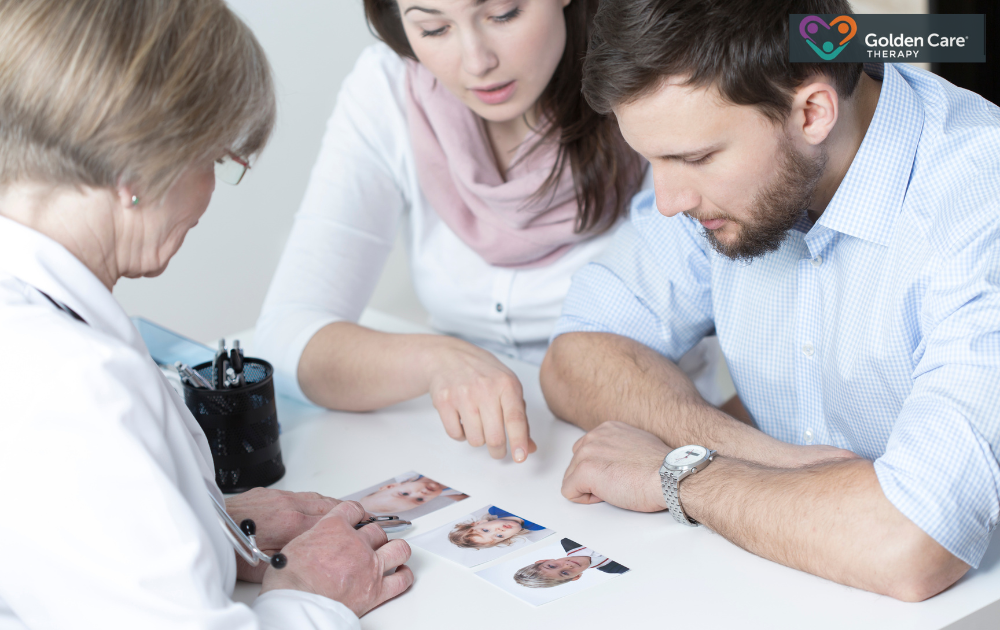Understanding autism spectrum disorder (ASD) involves delving into the world of genetics. De novo mutations (DNMs) are genetic alterations that play a significant role in this condition. This article explores what DNMs are and how they contribute to autism.
De Novo Mutations Explained
De novo mutations (DNMs) are a fascinating twist in the genetic story of autism spectrum disorder (ASD). Unlike mutations you inherit from your parents, DNMs are brand-new genetic alterations that appear for the first time in an individual’s DNA.
These mutations can arise during the formation of either sperm or egg cells in a parent, or even after fertilization in the newly formed zygote (the fertilized egg). Because they’re new occurrences, neither parent nor any ancestors would carry the same mutation.
DNMs come about through spontaneous errors during cell division or due to environmental factors. These errors introduce changes in the DNA sequence, potentially affecting how genes function.
Since genes act like blueprints for building our bodies, these alterations can disrupt normal development and contribute to various conditions, including autism. While DNMs are relatively rare events, they can have a significant impact.
DNMs in Family Genetics
De novo mutations (DNMs) stand out in family genetics because they arise spontaneously, not inherited from parents. Unlike typical genetic variations passed down through generations, DNMs appear for the first time in an individual’s DNA.
This is because they occur during the formation of egg or sperm cells (germline) or even after fertilization in the early stages of embryonic development. Since these mutations are new to the family lineage, they are absent in the DNA of parents and grandparents.
This unique characteristic of DNMs makes them a significant area of research in autism spectrum disorder (ASD). Studies have revealed a surprising link – a substantial proportion of individuals with ASD carry DNMs that contribute to their condition.
While DNMs are not the sole culprit, they are a piece of the complex genetic puzzle underlying ASD. Understanding how and why these mutations occur is essential for understanding ASD and paving the way for potential intervention and treatment.
Factors Influencing De Novo Mutations
Understanding the factors influencing de novo mutations (DNMs) is crucial for piecing together the complex genetic puzzle of autism. Two key aspects play a significant role: parental age and mutational signatures.

Parental Age and Increased Mutation Rates
Research has consistently shown a positive correlation between parental age, particularly paternal age, and the number of DNMs in offspring. As parents age, their reproductive cells (sperm and egg) undergo numerous cell divisions throughout their lifespan.
Each cell division presents an opportunity for errors to arise during DNA replication. These errors can translate into de novo mutations that are then passed on to the child. While the exact biological mechanisms are still under investigation, it’s well-established that advanced paternal and maternal age is associated with an increased risk of DNMs.
Mutational Signatures: Unique Fingerprints of DNA Changes
Beyond simply the number of mutations, the specific patterns of changes within the DNA sequence hold valuable clues. These unique patterns are known as mutational signatures. Interestingly, DNMs associated with paternal and maternal aging exhibit distinct mutational signatures.
Scientists analyze these signatures, considering the type of nucleotide substitution (replacement of one DNA building block with another) and the specific locations within the genome where the mutations occur. By deciphering these mutational signatures, researchers can gain insights into the underlying mechanisms causing DNMs specific to paternal or maternal age.

A Complex Interplay: Parental Age, Mutational Signatures, and Beyond
While parental age is a strong influencer, it’s likely part of a larger picture. Ongoing research delves deeper into the intricate relationship between parental age, mutational signatures, and the occurrence of DNMs.
Other potential factors being explored include environmental exposures, lifestyle choices, and individual genetic variations that might influence the susceptibility to mutations in sperm or egg cells.
Types of De Novo Mutations
There are different types of DNMs relevant to autism:
- Clustered vs. Nonclustered Mutations: Clustered DNMs occur close together in the genome, while nonclustered DNMs are scattered throughout. Studying their patterns can provide insights into the mechanisms behind DNMs in autism.
- Post-zygotic Mutations: These mutations occur after fertilization, affecting specific groups of cells. They differ from other DNMs in their mutational spectrum and can significantly impact brain development, potentially contributing to autism.
Understanding the different types of DNMs helps reveal the specific genetic changes associated with autism, paving the way for future advancements in understanding and treating the condition.
Detection and Tracing of De Novo Mutations
Detecting and tracing DNMs involves two important aspects:
- Low-Level Mosaic Mutations: In some cases, DNMs can be traced back to low-level mosaic mutations in a parent’s somatic tissue (non-reproductive cells). These mutations can recur in future offspring and require specialized techniques for detection.
- Recurrence in Offspring: While typically not inherited, some DNMs have been shown to reoccur in subsequent generations. Understanding this recurrence is vital for unraveling the genetic mechanisms behind autism.
Detecting and tracing DNMs helps uncover clues about the genetic underpinnings of autism, leading to a more comprehensive understanding of the condition.

Frequency and Characteristics of De Novo Mutations
De novo mutations are rare, but certain genes exhibit increased mutation rates. These genes may be larger in size or located in areas with higher mutation rates.
- The rarity of De Novo Mutations: Though uncommon, DNMs can have significant consequences for the development of autism. Researchers are studying the specific genes and factors associated with DNMs to understand their impact.
- Genes with Increased Mutation Rates: Some genes are more prone to acquiring DNMs due to their size or location. Studies have identified factors influencing mutation rates, such as DNA structure and gene expression levels.
Exploring these characteristics provides valuable insights into the genetic factors contributing to autism, potentially leading to future targeted interventions.
Research Insights on De Novo Mutations
Scientific studies have yielded valuable insights into DNMs and their connection to autism:
- Study Findings: A study identified and validated de novo mutations using advanced sequencing techniques. Functional analysis revealed that a subset of these mutations had the potential to cause harm by affecting genes crucial for cellular functions.
- Pathogenic Impact: De novo mutations can disrupt normal developmental processes by altering genes essential for cellular functions, potentially contributing to the development of autism.
Unraveling the impact of DNMs is leading to a deeper understanding of the genetic basis of autism. This knowledge opens doors for new research avenues and potential therapeutic interventions targeting the underlying genetic factors of ASD.
By continuing to explore de novo mutations, researchers are on the path to unlocking a deeper understanding of autism spectrum disorder (ASD). This knowledge paves the way for improved intervention strategies and potentially even future gene therapies.
Consider exploring ABA therapy, a structured approach proven to improve skills in individuals with ASD. Golden Care offers high-quality ABA therapy services in NYC, Indiana, New Jersey, Georgia, and Florida, staffed by experienced professionals.
Contact us today to learn more about their personalized ABA therapy programs and how they can help your child thrive!



